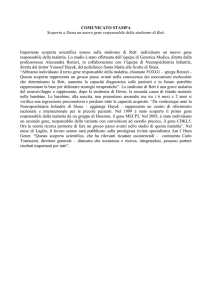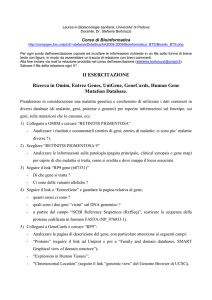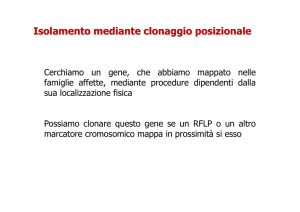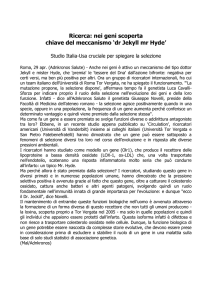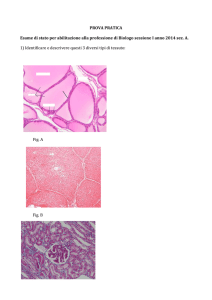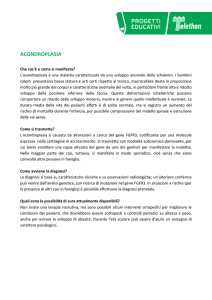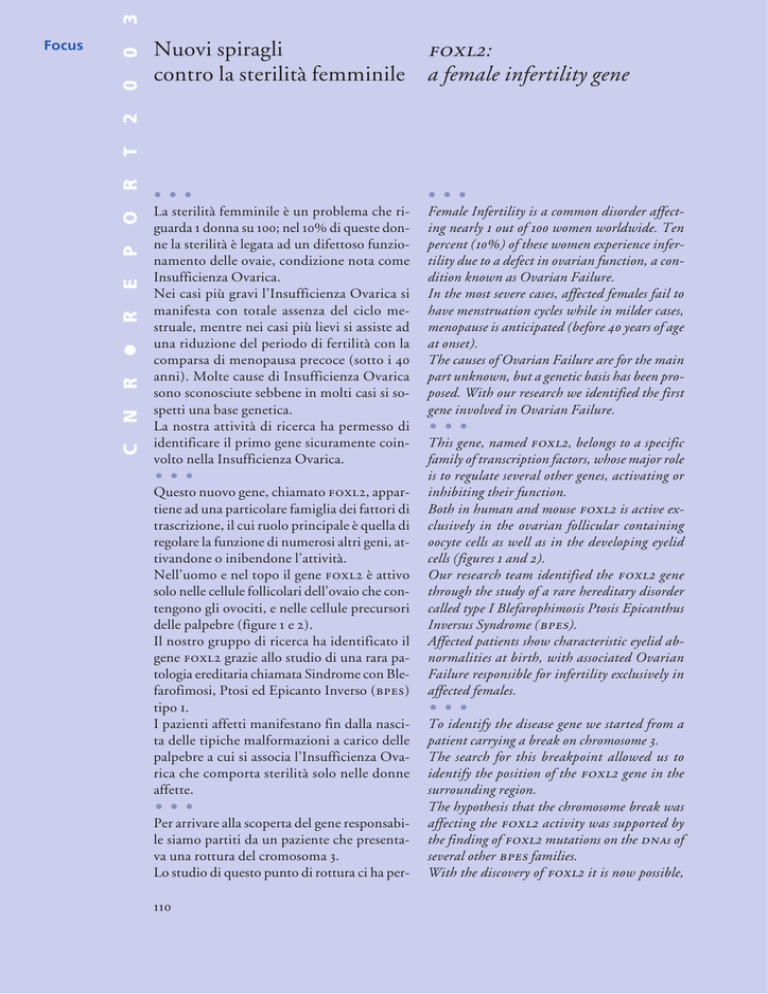
3
0
0
T
2
Nuovi spiragli
foxl2:
contro la sterilità femminile a female infertility gene
R
O
P
E
R
R
N
C
Focus
La sterilità femminile è un problema che riguarda 1 donna su 100; nel 10% di queste donne la sterilità è legata ad un difettoso funzionamento delle ovaie, condizione nota come
Insufficienza Ovarica.
Nei casi più gravi l’Insufficienza Ovarica si
manifesta con totale assenza del ciclo mestruale, mentre nei casi più lievi si assiste ad
una riduzione del periodo di fertilità con la
comparsa di menopausa precoce (sotto i 40
anni). Molte cause di Insufficienza Ovarica
sono sconosciute sebbene in molti casi si sospetti una base genetica.
La nostra attività di ricerca ha permesso di
identificare il primo gene sicuramente coinvolto nella Insufficienza Ovarica.
Questo nuovo gene, chiamato foxl2, appartiene ad una particolare famiglia dei fattori di
trascrizione, il cui ruolo principale è quella di
regolare la funzione di numerosi altri geni, attivandone o inibendone l’attività.
Nell’uomo e nel topo il gene foxl2 è attivo
solo nelle cellule follicolari dell’ovaio che contengono gli ovociti, e nelle cellule precursori
delle palpebre (figure 1 e 2).
Il nostro gruppo di ricerca ha identificato il
gene foxl2 grazie allo studio di una rara patologia ereditaria chiamata Sindrome con Blefarofimosi, Ptosi ed Epicanto Inverso (bpes)
tipo i.
I pazienti affetti manifestano fin dalla nascita delle tipiche malformazioni a carico delle
palpebre a cui si associa l’Insufficienza Ovarica che comporta sterilità solo nelle donne
affette.
Per arrivare alla scoperta del gene responsabile siamo partiti da un paziente che presentava una rottura del cromosoma 3.
Lo studio di questo punto di rottura ci ha per110
Female Infertility is a common disorder affecting nearly 1 out of 100 women worldwide. Ten
percent (10%) of these women experience infertility due to a defect in ovarian function, a condition known as Ovarian Failure.
In the most severe cases, affected females fail to
have menstruation cycles while in milder cases,
menopause is anticipated (before 40 years of age
at onset).
The causes of Ovarian Failure are for the main
part unknown, but a genetic basis has been proposed. With our research we identified the first
gene involved in Ovarian Failure.
This gene, named foxl2, belongs to a specific
family of transcription factors, whose major role
is to regulate several other genes, activating or
inhibiting their function.
Both in human and mouse foxl2 is active exclusively in the ovarian follicular containing
oocyte cells as well as in the developing eyelid
cells (figures 1 and 2).
Our research team identified the foxl2 gene
through the study of a rare hereditary disorder
called type I Blefarophimosis Ptosis Epicanthus
Inversus Syndrome (bpes).
Affected patients show characteristic eyelid abnormalities at birth, with associated Ovarian
Failure responsible for infertility exclusively in
affected females.
To identify the disease gene we started from a
patient carrying a break on chromosome 3.
The search for this breakpoint allowed us to
identify the position of the foxl2 gene in the
surrounding region.
The hypothesis that the chromosome break was
affecting the foxl2 activity was supported by
the finding of foxl2 mutations on the dnas of
several other bpes families.
With the discovery of foxl2 it is now possible,
3
0
Focus
2
0
Nuovi spiragli
contro la sterilità
femminile
C
N
R
R
E
P
O
R
T
foxl2: a female
infertility gene
{1}
{2}
{1}
Sezione di ovaio di topo adulto. Il colore blu evidenzia la presenza di attività (rna messaggero) del gene foxl2 nei follicoli ovarici
(f) che circondano l’ovocita (o).
Sections of adult mouse ovary. The blue color shows the presence of foxl2 gene activity (messenger rna) in ovarian follicles (f)
surrounding the oocytes (o).
{2}
Embrioni di topo di 14.5 giorni di gestazione; a sinistra la freccia indica la presenza di attività (rna messaggero) del gene foxl2
nelle palpebre in via formazione (in viola); a destra la freccia indica le palpebre di un animale di controllo.
14.5 day old gestation of mouse embryos. Left, the arrow points out the presence of foxl2 gene activity (messenger rna) in the developing
eyelids (violet). Right: the arrow indicates the eyelid of a control animal.
messo di scoprire l’esistenza del gene foxl2
nelle sue immediate vicinanze.
L’ipotesi che tale rottura cromosomica avesse alterato la funzione di foxl2 è stata successivamente supportata dal riscontro di mutazioni nello stesso gene in numerose famiglie
con bpes.
Con la scoperta del foxl2, è oggi possibile
per la prima volta fare diagnosi molecolare di
bpes.
Inoltre oggi sappiamo che per il normale sviluppo dell’ovaio e per il suo corretto funzionamento è indispensabile la presenza delle
due copie funzionali di foxl2.
Questa scoperta permetterà di identificare
più facilmente altri geni da esso regolati che
sono direttamente coinvolti nello sviluppo e
nella funzione ovarica.
Nonostante foxl2 sia mutato solo in alcuni
casi d’Insufficienza Ovarica (associata a bpes),
è possibile che sia esso stesso mutato nelle forme comuni di sterilità femminile, oppure che
alcuni dei geni da esso regolati siano coinvolti in questa frequente patologia.
111
for the first time, to carry out molecular diagnosis of bpes.
Also, we now know that the presence of two
foxl2 active copies is necessary for the development and maintenance of the correct number of
ovarian follicles.
With this information we have the possibility to
identify its targets: those genes regulated by
foxl2 which are directly involved in ovarian
development and function.
While foxl2 mutations account for only a
small fraction of Ovarian Failure (bpes associated), the study of its pathway will probably
lead not only to new diagnostic tools for early diagnosis, but also to the development of new targeted therapeutic protocols for a disorder for
which no treatment is currently available.
foxl2 could be used in the future as a marker
of female fertility to evaluate the female reproductive potential.
Finally, it is quite interesting that from a rare
syndrome such as bpes, we were able to identify the cause of a disease which is much more
common.
3
cnr
Istituto di neurogenetica
e neurofarmacologia
0
R
Lo studio della sua via funzionale permetterà
di ottenere dei presidi diagnostici specifici e
soprattutto permetterà di sviluppare dei nuovi protocolli terapeutici mirati per un difetto
per il quale non esiste attualmente alcun rimedio.
foxl2 potrà inoltre diventare un marcatore
di fertilità femminile con il quale valutare la
potenzialità riproduttiva di una donna.
In conclusione, è di particolare interesse il fatto che da una sindrome rara quale è la bpes,
si sia arrivati ad individuare una delle cause di
una malattia ben più diffusa.
I dettagli del lavoro, in parte finanziato dalla
Fondazione Telethon, sono stati pubblicati
sulla rivista Nature Genetics (Crisponi et al.
27: 159-166; 2001).
R
Focus
2
0
Nuovi spiragli
contro la sterilità
femminile
C
N
E
P
O
R
T
foxl2: a female
infertility gene
112
Details of the study, partially funded by the
Telethon Foundation, have been published on
Nature Genetics (Crisponi et al. 27: 159-166;
2001).
cnr
Institute of Neurogenetics
and Neuropharmacology





